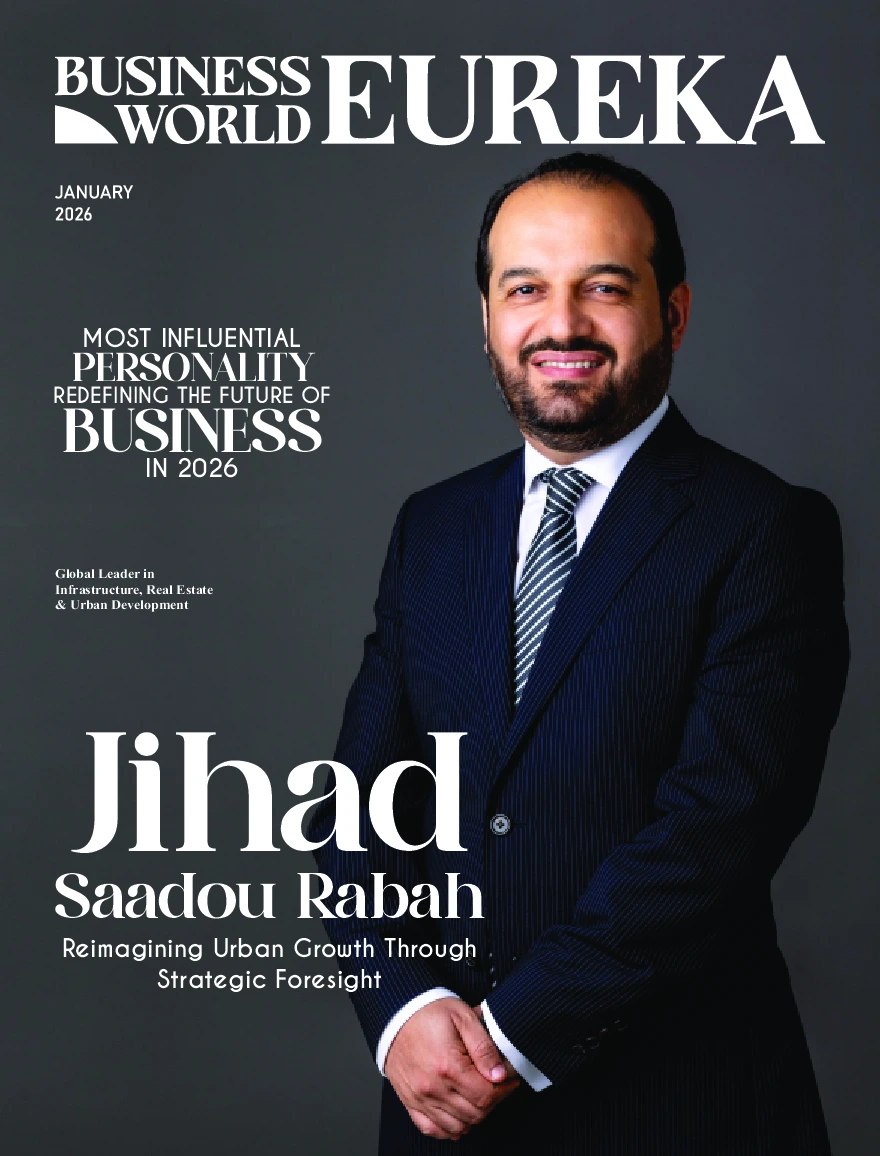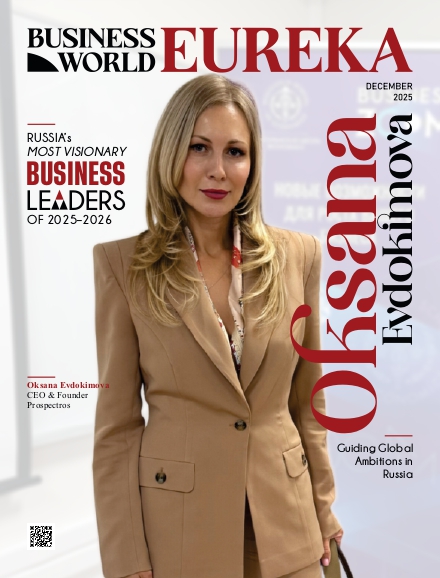Gustavo Sosa: Harnessing Nature’s Potential for Greener Farms

The quest for sustainable solutions has become increasingly important in the agricultural realm. With global populations soaring and consumer preferences shifting towards healthier, environmentally friendly products, the agricultural sector finds itself at a critical juncture. In addition, stringent regulatory policies and environmental laws underscore the need for sustainable agricultural solutions.
Aligned with these challenges, INBIOAR, under the leadership of Gustavo Sosa, is dedicated to promoting a healthier, low-waste world through its botanical ingredients, which support integral and sustainable crop protection practices. The company is strategically positioned within the growing global biologicals industry with the goal of contributing significantly to agricultural innovation and meeting the changing demands of contemporary farming methods.
Gustavo Sosa, Founder and Scientific Director at INBIOAR-Global (BVI) LTD and INBIOAR SAS in Argentina, is committed to participating in a modern, dynamic, and global agriculture landscape. His vision is to offer the industry new tools for producing better and healthier foods. Under his leadership, INBIOAR has become a solid team, achieving milestones such as obtaining a patent and publishing two papers with the USDA.
Advancing Sustainable Crop Protection Solutions
INBIOAR has been committed to investigating and creating novel active ingredients specifically for the agroindustry since 2010. The organization has painstakingly created a methodical procedure by combining a synergistic strategy that incorporates field work, careful observation, laboratory tests, and rigorous greenhouse and field trials. This procedure is intended to efficiently locate, assess, and choose plant extracts with the most promising potential to improve crop protection methods.
Through the use of this thorough technique, INBIOAR is able to carry out its purpose of developing cutting-edge solutions to meet the changing needs and problems of contemporary agriculture. This pledge emphasizes how important it is for the company to continue advancing crop protection techniques that are both efficient and sustainable in the agriculture industry.
Gustavo and his team have developed a cutting-edge discovery platform to find novel active ingredients for bio-herbicides. This method is powerful enough to determine the presence of bio-insecticides, bio-fungicides, and bio-stimulants, giving a comprehensive approach to crop protection.
From Discovery to Innovation
It all began when Gustavo was a third-year forest engineering student. During that period, he discovered that Prosopis alba, a type of tree, was growing as a monoculture in the wild. Through numerous experiments, Gustavo identified seed germination inhibitors in the tree’s fruits. The soil beneath these trees was littered with the fruits. He hypothesized that the tree protected itself from other plant species by releasing a chemical. Interestingly, Prosopis alba seedlings thrived around the “mother” tree, supporting his theory.
Since other Leguminosae species were not affected by the inhibitor Gustavo found, he postulated a more generalized allelopathic process related to prosopis. Over the course of two decades, this concept developed, and when he created Genetica Vegetal SA, he pitched it to potential investors. In less than two months, he was fully engaged in the purification of the inhibitor, pinitol, a seven-carbon sugar that is widely found in the Leguminosae family as an osmolyte. Promising initial lab tests led to the submission of a patent. A multinational German business, however, determined that the inhibitor was not suitable for use in agriculture.
Gustavo was unfazed and planned to significantly broaden the scope of his studies. After founding INBIOAR, he set himself the lofty goal of gathering 100 plant samples per month for two years, resulting in a total of 2400 samples. This massive endeavor resulted in a second patent application that was approved this time.
Unveiling Agricultural Revolutions
Gustavo’s discovery platform turned out not to be patentable, a typical occurrence where elegance conceals minute features that are essential to success. The efficiency of the platform depends on painstaking numerical analysis made possible by accurate sample localization and screening procedures. Almost 4,000 samples have been gathered so far, and it is only because of the sizeable dataset that conclusive findings have surfaced.
Because of its intrinsic simplicity, the platform is resilient and flexible in a variety of geographical locations. In the end, its use has produced important discoveries for the crop protection sector.
Global Impact through Scientific Collaboration
INBIOAR benefited greatly from a cooperative collaboration led by the USDA under Gustavo’s direction, which supplied crucial cooperation and global institutional support. Close collaboration with USDA scientists improved their approach and provided an incredibly rich learning experience.
As a result of the partnership, INBIOAR was able to join a multinational group that is well-positioned to have a significant worldwide influence. The team’s study into greenhouse experiments advanced because of the methodological advancements made possible by the insights obtained from this partnership.
These efforts produced two seminal papers: the first focused on chemical changes, while the second strengthened their experimental framework in greenhouse environments. This stage highlighted how chemistry can be used to optimize the effectiveness of agricultural chemicals.
Gustavo and his team investigated how weather-adaptable plants are, with a special emphasis on Argentina’s semi-desert areas. Since plants cannot move to escape environmental difficulties, they conjectured that plants in semi-desert regions could have biochemical adaptations that aid in their survival.
Unlocking Nature's Potential
Their research showed a strong correlation: when samples were taken from semi-desert areas, almost 70% of the samples had positive herbicide, insecticide, fungicide, or growth stimulant test results. This high success rate demonstrated how well the area fit their study goals. On the other hand, areas with colder or more humid conditions produced little to no positive test results.
Based on this discovery, INBIOAR predicted that plants actively producing chemicals of interest, especially growth inhibitors, are found in semi-desert environments.
The team has achieved good results in Argentina which has opened doors for more funds. Although, it is still difficult to gather funds, which Gustavo believes is common for any business, but he is optimistic with the results. The team is also planning to install its project in Texas which is not far from the current location. Gustavo highlights that good results are the best tool to convince the investors and the industry.
Bridging Science and Business
Gustavo gained a pivotal insight into the symbiotic relationship between science and business during a conversation with a scientist from the Weizmann Institute in Israel. He learned that while fundamental scientific research forms the foundation, successful commercialization hinges on effectively bridging the gap between science and business. This lesson inspired Gustavo to integrate similar principles at INBIOAR, emphasizing that technological transfer to industry must be meticulous and strategic.
Understanding that exceptional scientific research is fundamental to business success, Gustavo highlighted the importance of maintaining high scientific standards. This approach ensures that innovations are not only scientifically robust but also commercially viable. By applying these principles, Gustavo aimed to elevate INBIOAR’s research efforts, ensuring they were not only impactful in scientific circles but also positioned to thrive in the competitive landscape of industry.
Commitment to Sustainability and Ethical Research Practices
The recognition that genetic resources and ancient knowledge are inherently tied to specific countries and regions led INBIOAR to adhere strictly to the Nagoya Protocol. This international agreement safeguards biodiversity and traditional knowledge, requiring authorization from each state office in Argentina before collecting plant samples. Without these permits, technology transfer becomes impossible, as companies must obtain authorization prior to conducting any testing.
From a scientific standpoint, the strategy is straightforward: INBIOAR focuses on semi-desert regions globally, which offer ample genetic diversity suitable for their research objectives. Securing financial resources is equally crucial, although prioritizing the selection of the region precedes financial considerations. Human resources are developed through training initiatives for recent graduates, reinforcing INBIOAR’s commitment to nurturing talent capable of contributing to their scientific and business endeavors.
Gustavo and INBIOAR found a big vacuum in the field of agricultural innovation: there are no reliable bio-herbicides for large-scale crops grown in the world, including organic and small-scale farming. Bio-fungicides, insecticides, and stimulants that come from natural sources are widely available, but bio-herbicides are still in their infancy and not advanced enough to meet the demands of the agricultural industry.
INBIOAR uses a strategic approach, concentrating their efforts on bio-herbicides. After obtaining a sample, it is put through a series of tests, one of which is an assessment of its bio-nematicidal qualities. Its main area of study is bio-herbicides, but it also includes secondary findings like bio-nematicides in their extensive program.
INBIOAR works in close partnership with prestigious organizations in the US and Argentina. Utilizing alliances with the National Council of Research (CONICET) and the National University of Rosario, it makes use of their advising and service support in Argentina. On the other side of the Atlantic, INBIOAR works with organizations that are well-known for their proficiency in agricultural science and technology: Bioceres and the USDA.
Leading the charge in the creation of a novel bio-herbicide for large-scale crops, INBIOAR is keeping a close watch on the movement in agricultural trends worldwide toward sustainability. H004 is a bio-herbicide that was developed in partnership with Bioceres and is intended to work gradually, much like glyphosate. The business is currently working on the critical purification stage and expects great things from this novel active component.
This strategic alignment with key partners and dedication to advancing sustainable agricultural solutions positions INBIOAR at the forefront of agricultural innovation, poised to capture the burgeoning market demand for eco-friendly herbicides.
Paving the Paths
Gustavo draws attention to how many opportunities there are right now in the agricultural industry. He highlights the need for new concepts in order to increase the variety of instruments that farmers can use, emphasizing how crucial it is to match innovations with the real-world requirements of farmers. Gustavo suggests that the industry may flourish and successfully fulfill the changing demands of modern agriculture by concentrating on improving competitiveness and providing products that directly address farmers’ expectations.
Latest Editions
-
 Most Influential Personality Redefining the Future of Business in 202605 Feb 2026 magazines
Most Influential Personality Redefining the Future of Business in 202605 Feb 2026 magazines -
 World's Most Inspiring Keynote Speakers to Watch in 2025–2602 Jan 2026 magazines
World's Most Inspiring Keynote Speakers to Watch in 2025–2602 Jan 2026 magazines -
 Russia’s Most Visionary Business Leaders of 2025–202619 Dec 2025 magazines
Russia’s Most Visionary Business Leaders of 2025–202619 Dec 2025 magazines -
 Sheroes: UK's Most Visionary Leader Making Their Mark in the Global Education Landscape, 2025–2602 Dec 2025 magazines
Sheroes: UK's Most Visionary Leader Making Their Mark in the Global Education Landscape, 2025–2602 Dec 2025 magazines -
 Europe’s Most Influential Business Leaders to Watch in 2025-2630 Nov 2025 magazines
Europe’s Most Influential Business Leaders to Watch in 2025-2630 Nov 2025 magazines

